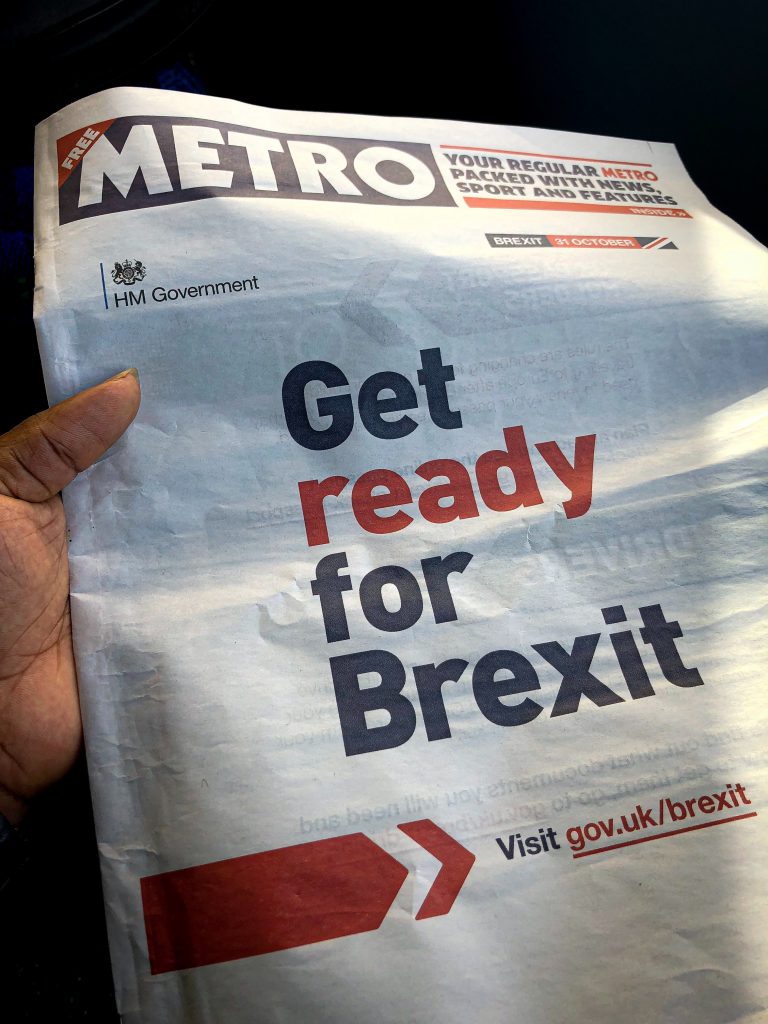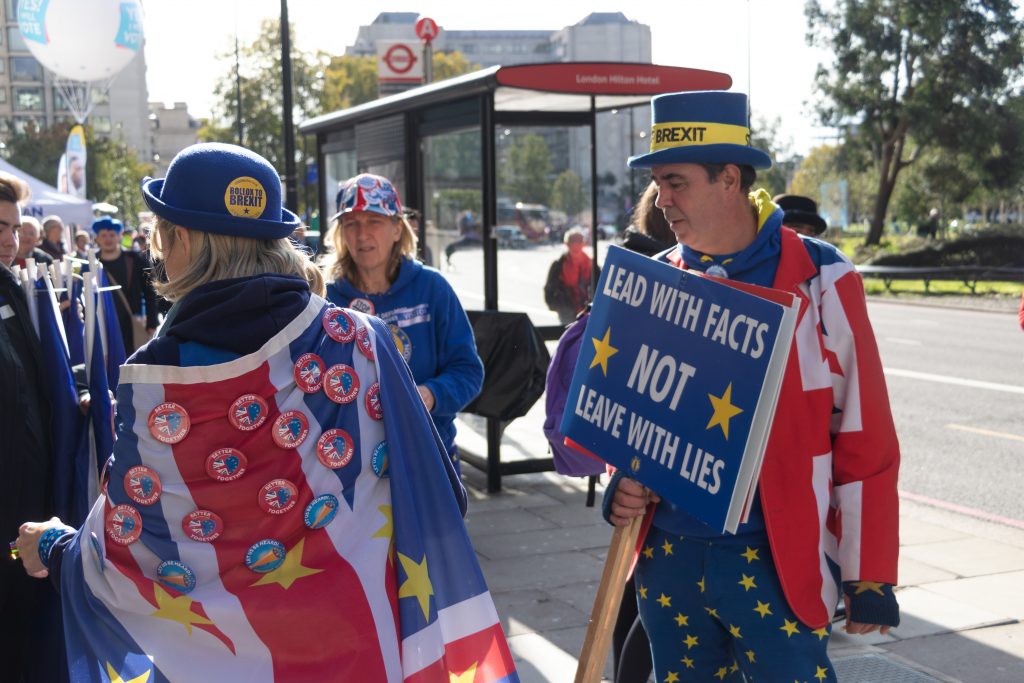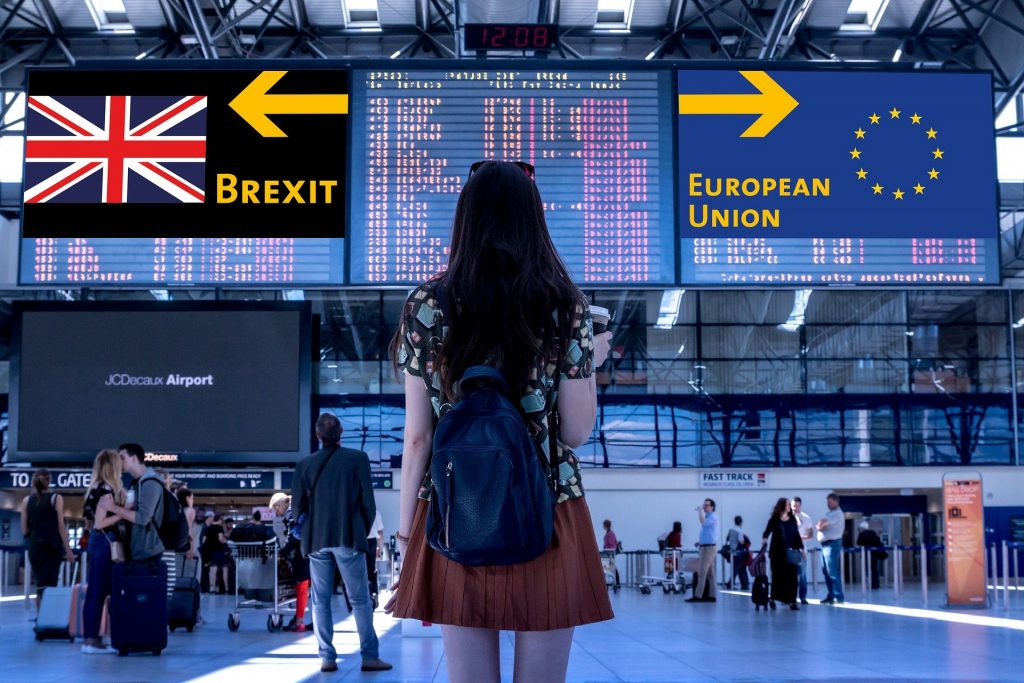After a disastrous 2020, the United Kingdom finished off the year by officially leaving the European Union. Alexander Devkota takes a closer look at the differences between what the Leave campaign promised during the referendum period, and what has and will actually occur in the years to come in Britain.
Among the most influential campaigns of the 2016 referendum, ‘vote leave’ summarised their argument as to why people ought to vote leave on a poster. The following 5 points were made:
- Saving £350 million a week, which, they suggested, could instead be spent on the NHS, schools, and housing
- Being in charge of our borders, suggesting that we were not able to do so with overruling of EU judges
- Controlling immigration, such that we could let people in based on the skills they have rather than the passports they hold
- Ability to trade freely with the whole world; without EU restrictions, they argued, this could generate more jobs
- Being able to make our own laws, arguing that the EU is undemocratic and thus, shouldn’t be making our laws
Three of these points, spending, immigration, and law-making, were observed as the top reasons for voting leave given by surveyed voters in a 2018 investigation by Nuffield College, Oxford, in association with the Social Research Council’s The UK in a Changing Europe initiative. Suggesting that these primary arguments put forward by vote leave were some of the most influential justifications for voting leave for members of the public. More recently, British sovereignty has been frequently referenced as the purpose of Brexit, that being, power of a state to govern itself without interference from outside bodies. We could see each of these key points as extensions of the idea of sovereignty – sovereignty overspending, borders and immigration, law, and trade. As such, considering the newly signed trade and cooperation agreement, we can examine the reality of the Brexit as it looks now, and as it pertains to the accuracy of the results suggested in this condensed ‘vote leave’ poster, and as it relates to Britain’s sovereignty.

The deal-making process stood in stark contrast to that suggested by prominent leave campaigners. Casting an eye back to the words of a couple of former UKIP leaders, we find that Paul Nuttall’s assertion that, “it will be so easy to negotiate a trade deal”, or Gerard Barren’s that, “a trade deal with the EU could be sorted out in an afternoon over a cup of tea”, failed to accurately predict the reality as observed over the last 4 years. Whether this was pure conjecture, attempting to play down the complexity of the process for would-be voters, or a sign of the ignorance of leading leave campaigners to the reality that would be faced in the event of a leave vote is unclear. But, as with their statements regarding the process of deal-making, the reality of the statements made by leave campaigners about law-making post-Brexit also seem to not line up completely with reality.
Published on Christmas eve, the 1246 -page trade and cooperation agreement (TCA) details the plan for the creation of a primary body to deal with, “any issues relating to the implementation, application and interpretation” of the TCA named the ‘Partnership Council’ – to be comprised of representatives from the EU, and the British government. With powers to make legally binding decisions regarding the TCA, the Partnership Council whose every decision will have to be approved by its EU representatives, comprises just one example of how, many laws affecting Britain, will still be heavily influenced by the EU.
Regarding the production of goods in the UK, those wishing from a divergence from EU policy are also likely to be unsatisfied. As the EU is the UK’s largest trading partner, following its regulations is likely to be necessary for any good produced that could be exported. That being said, it has been suggested that goods could now be produced that don’t adhere to EU regulations for the domestic market, but it appears unlikely that many businesses will begin manufacturing goods that can’t be exported to our largest trading partner. The key difference between our time in the EU, as opposed to our future outside of it in this regard would be in our lack of influence over the laws set by the EU regarding the regulation of goods for export. Since we will generally have to continue to operate under EU regulation in this regard, but with a lessened capacity to enact change, this would surely constitute a lessening of sovereignty.

Taking a more specific example, a legal dispute often referenced during the lead up to the referendum was of the legal control the EU had been exercising over the fishing of waters around the UK. This can be seen in a Facebook post from June 2016 on Boris Johnson’s page featuring a picture of him holding a lobster with a bemused look on his face stated, “if we Vote Leave we can take back control over UK waters, set our own fishing policies, and support our fishermen”. Despite this claim, the details of the established trade deal have led Barrie Deas, chief executive of the British National Federation of Fisherman’s Organisations, to claim that the deal “will inevitably be seen by the fishing industry as a defeat”. Similar condemnation coming from SNP leader Nicola Sturgeon, who pointed to the expected damage that the agreed terms regarding fishing will have on fisheries around the country. Regarding law-making then, a key example used in the leave campaign of the control we would take back regarding EU laws affecting British lives and businesses, doubtless influencing voters, seems to have come to nothing, with terms risking serious damage to the future of the British fishing industry.
In regards to immigration and borders, the claim made by leave campaigners was often that the EU prevented Britain from controlling its borders, suggesting that leaving would allow us to do just that. As highlighted by Nigel Farage in his recent complaints regarding European countries shutting their borders to Britain on account of increasing levels of COVID, however, the EU does allow for control over borders with other European countries, and non-European countries. This control was just not exercised to as great a degree as it could have by the British government. When looking at border closure by European countries, Brexit means that Britain will have a harder time contesting arbitrary border controls from EU members in the future. As noted by politico, there are plans to implement a points-based system for controlling immigration. However, the suggestion of cabinet minister, Michael Gove, that immigration could be cut to the tens of thousands if Britain voted leave, is still highly unlikely. Brexit simply making such a points-based system possible to implement without needing to give special regard to holders of EU passports.
As Britain’s membership in the EU was not as part of the Schengen Area, the British government retained full control over borders when joining in the first place, as such, the only meaningful power Britain has gained is the power to take a harsher approach with asylum seekers than the EU would allow. Additionally, in regard to asylum seekers, Britain’s control over border controls and over the formal asylum-seeking process meant that, even as a member of the EU, Britain could have exercised tighter control over asylum seekers coming in to avoid any risk of bringing in terrorists. Something that the leave campaigners argued we couldn’t. As such, there is no reason to associate the control gained through leaving with a greater ability to safe-guard against terrorism, as Britain already had the power to turn people who were deemed dangerous away. The only power gained is one to more easily turn away people who pose no credible threat.

In relation to spending, the issue must be addressed first in terms of the reality of EU spending, and secondly in terms of the reality of post-Brexit spending. The figure often touted in relation to Britain’s EU membership and was famously put onto the side of a bus was £350 million a week. This adding up to around £18 billion a year. Looking at Britain’s 2018 contributions, we can see that the total amount left after rebate and contributions by the EU into Britain amounted to around £9 billion, less
than half the figure advertised on the bus. Boris Johnson’s use of the bus figure described by the chair of the UK Statistics Authority as “a clear misuse of official statistics”.
On top of this, the EU’s multi-billion pound a year investment into the private sector in the UK leaves the net contribution closer to £7 billion. Through Brexit then, Britain might be thought to gain £7 billion a year, but if the EU’s investment into the British public and private sectors is to be matched, the reality is that close to £6.5 billion would have to be spent just to maintain the EU’s level of investment. This leaves a saving of roughly £0.5 billion each year, or roughly £10 million a week – 3% of the figure suggested by the leave campaign. Taking this into account, the roughly £500 million a year the UK could have access to, not paying EU membership (or around 2% of the cost of additional investment in defence planned in the 2020 budget), is dwarfed by the cost of Brexit so far, estimated by Bloomberg Economics to be over £200 billion by the end of 2020. At such a cost, the money saved by not paying for membership in the EU will be enough to cover the cost incurred over the 4 years since voting in roughly 400 years.
Additionally, if we are to take this saving and invest it, as vote leave suggested we could, into the NHS, education, and building new homes, it would make up only a minor increase overall in any of these areas. Taking the NHS for example, the savings represent less than 1% of the annual budget, and this is assuming all of the saved money is put into the NHS, rather than some being used to bolster the education budget or to build affordable housing. Given that, according to the health service’s electronic staff record, around 5% of NHS staff are citizens of EU countries, the effect of complicating and limiting access to this pool of staff might be expected to be more costly to the NHS than the increased spending could make up for. Regarding this, it appears as though there can be no significant increase in sovereignty associated with the additional capacity for spending seen without Britain’s contributions to the EU.
On the fourth point on vote leave’s poster, we must consider both the broader claim, and the more specific one, namely: that Britain would have a greater ability to trade with the whole world, and that this would lead to the generation of more jobs. On the first point, one must consider whether Britain had a lessened ability to trade outside of the EU due to membership, the general claim made is that the UK would be able to set lower tariffs on trade than the EU and reap the benefits of cheaper imports. The reality is that the EU already waives tariffs on 50 developing countries, and, although the lowered tariffs possible outside of the EU could, according to the Institute for fiscal studies, result in around a 1% drop in prices faced by households. This drop in prices would be accompanied by an increase in the cost of trade associated with the new checks required under a new trading relationship with the EU, the associated costs of these exceeding the savings from free trade outside of the EU, resulting, according to the IFS, in a higher cost overall for households out of the EU. So, it may be possible that the UK would have more sovereignty regarding trade, but this sovereignty would come at a cost, increasing costs faced by British households.
On the second point, whether this specific change in the nature of Britain’s trading outside of the EU could be seen to lead to new jobs; as mentioned, the new checks on trade with the EU are likely to result in new jobs; whether these jobs will be enough to make up for the job losses associated with Brexit is hard to determine. With close to 10,000 jobs in finance alone planned to be moved to Europe, there would have to be a significant number of jobs created to deal with the complications of trade to lead to an increase in jobs overall.

Looking at this information all-in-all, it appears as though, under the terms set under the trade and cooperation agreement, there can be seen to be very few results of Brexit suggested by vote leave that were at-all accurate, and very few significant increases in sovereignty. Other than the sovereignty to make trade agreements outside of the EU that will increase costs for consumers, the most significant increase in sovereignty seems to be a newly developed ability to turn away would-be asylum seekers who pose no threat. In hindsight, the poster used to push for leaving the EU that most accurately portrayed the ways sovereignty would increase was the one Nigel Farage was pictured standing proudly in front of – an image teeming with non-white immigrants and refugees, accompanied by the words ‘breaking point’ in bold, red type.